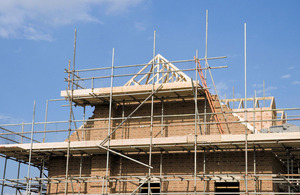Changes to make it cheaper to build own home could help many self-builders
New measures could make it cheaper for aspiring self-builders to get their ‘grand design’ off the ground.

Proposed changes could save self-builders thousands of pounds by ensuring they are exempt from paying a levy charge that must be paid for all new buildings over a certain size.
The government is committed to helping more people achieve their aspirations of owning a home and wants to help boost housing supply by making self-build housing a mainstream option.
The proposed relief from paying the Community Infrastructure Levy would cover homes built or commissioned by individuals, families or groups of individuals for their own use and that will be owner-occupied.
Planning Minister Nick Boles said:
“For too long, self-build homes have been seen as an option for only a privileged few and we are determined to change that with proposals that have the potential to save self-builders thousands of pounds.
“Our proposals would ensure that self-build homes are exempt from this levy and will make an enormous difference to people looking to realise their dream of buying a plot of land and getting a builder to build them a home.
“We urgently need to build more homes and the proposed changes to the levy will help increase housing supply and help those businesses keen to grow.”
Housing Minister Mark Prisk said:
“I am determined that anyone who wants to build their own home should have the opportunity to do so.
“That’s why on top of the £44 million funding we’re making available to help aspiring self-builders and local community groups to get their projects off the ground, today’s proposals will ensure these small and bespoke projects do not incur large infrastructure bills through the levy.
“This package of support, combined with the advice available from leading self-build organisations, will ensure those looking to build will have the information and help they could need at their fingertips.”
Single build homes have far less impact on infrastructure, whereas larger developments are likely to have more of an impact on an area from the cumulative effect of their building. Along with helping people build their own home other proposed changes to improve the levy system will also benefit councils and developers.
The Community Infrastructure Levy allows councils to raise funds from developers undertaking new building projects in their area. The money raised is used to fund the infrastructure needed to support the development and to support local communities.
Consultation
A consultation issued today (15 April 2013) proposes changes that would boost development and the building of new homes and businesses. The changes will make the levy fairer, faster, more certain and more transparent. The levy already provides developers and landowners with more certainty ‘up front’ of how much money they will have to contribute towards infrastructure. New proposals include:
- changes that will ensure councils provide greater clarity on how they have set the proposed level of levy and more transparency about what developers will be charged
- allowing councils to accept levy payments in kind from developers providing infrastructure instead of cash or land to ensure timely delivery of infrastructure
- ensuring that where planning permission is phased, levy payments are also phased to help get development underway as soon as possible
- enabling councils to make discount market sale housing exempt from levy charges
- removing the current vacancy test meaning the levy will not generally be payable on buildings that have been vacant for a certain amount of time but are being refurbished or redeveloped to bring them back into productive use - the levy would still be payable on abandoned buildings or vacant buildings being redeveloped with an increase in floorspace
- allowing councils that have not adopted the levy to continue to pool contributions from different planning obligations for an extra year - this will now give councils who have not started the process of adopting the levy until April 2015 to take on board any regulatory changes that arise from this consultation
Further information
The Community Infrastructure Levy was introduced in 2010 and allows local authorities in England and Wales to charge a levy to fund infrastructure. The Localism Act, and regulations, made under it will reform the levy by requiring a proportion of the levy receipts to be passed to the community where development takes place.
The government has listened carefully to early experiences and has worked closely with representatives from the development industry and local government in identifying reforms which would improve the operation and roll out of the levy.
The government has already implemented the following actions to help boost the self-build housing sector. This includes:
- ensuring councils establish the demand for self-build housing in their area, and plan for the needs of people who want to build their own home
- maximising opportunities for self-builders to access land which central government is releasing as part of its accelerated surplus public land disposals programme
- working with the self-build industry, local authorities and the house building sector to promote locally planned self-build home housing developments where opportunities arise
- working with the self build industry to launch an online Self-Build Portal which acts as a 1-stop shop for advice and support to would-be self-builders
- launching a £30 million investment fund to help community groups, builders and other organisations to get their self build projects off the ground
- giving more community groups the ability to access £14 million of available support funding to help them initiate their local projects, even if they do not plan to use the Community Right to Build under the Localism Act 2011
Further information can be found on the consultation page.
Media enquiries
Email newsdesk@communities.gov.uk
Please use this number if you are a journalist wishing to speak to Press Office 0303 444 1209